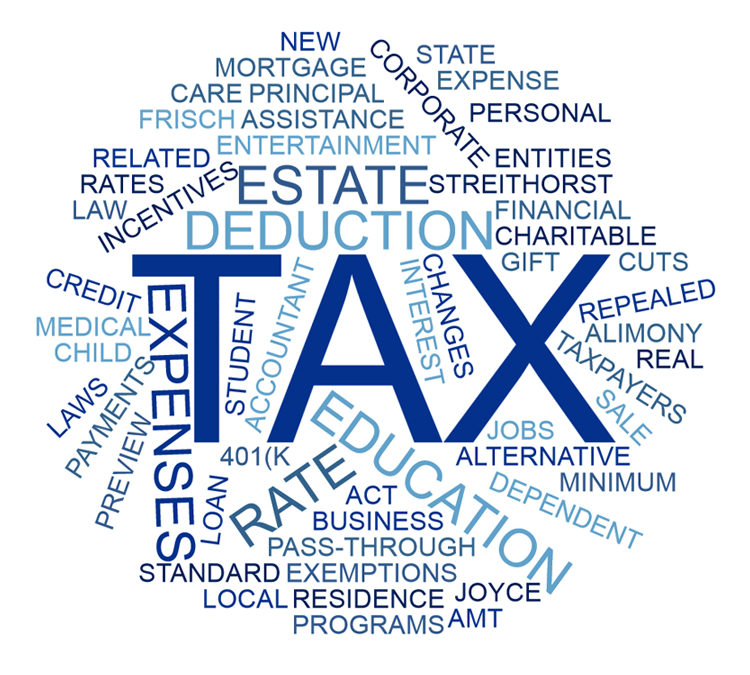We share some details of the proposed tax law changes that may affect you in 2018.
On November 2, 2017 the long-awaited tax reform bill was released by the Republican members of the House Ways and Means Committee. The 429-page “Tax Cuts and Jobs Act” includes many proposed changes to both individual and corporate income taxes. This bill may change and needs to be voted upon before it becomes law. Most proposed changes would take effect in 2018. Here are some of the highlights:
Taxes Rates
The current 7 marginal brackets of 10%, 15%, 25%, 28%, 33%, 35% and 39.6% would be condensed to 4 marginal income tax brackets: 12%, 25%, 35% and 39.6%.
Standard Deduction
The bill looks to increase the standard deduction from $6,350 for individuals to $12,000 and from $12,700 for married couples to $24,000. Currently about 2/3 of taxpayers use the standard deduction and that is projected to increase to 90% if these changes take effect.
Personal Exemptions
Personal Exemptions are eliminated.
State and Local Tax Deduction
Current law allows individuals to deduct state and local taxes as an itemized deduction. This would be eliminated in the proposed plan for individuals but allowed for businesses.
Real Estate Tax Deduction
Taxpayers can continue to claim an itemized deduction for property taxes up to a $10,000 limit.
Mortgage Deduction
Taxpayers can currently deduct mortgage interest on mortgages up to $1,000,000 of acquisition debt on both a primary residence and a 2nd vacation home. The new law would reduce this to $500,000 only on a taxpayer’s principal residence and would only apply to new-home purchases after November 2, 2017.
Medical Expense Deduction
No deduction would be allowed for medical expenses.
Charitable Deduction
Charitable contributions remain a deduction, with a few minor changes.
401(k) Changes
No changes to pre-tax 401(k) contribution limits.
Sale of Principal Residence
Current law states that every 2 years a taxpayer can exclude a gain of $500,000 if married filing jointly or $250,000 for single taxpayers, if you own and live in the home for 2 of the last 5 years. The proposed law for sales and exchanges after 2017 states that a taxpayer must own and use the home for 5 of the previous 8 years and the exclusion would be available once every 5 years. In addition, the exclusion would start to be phased out when AGI (Adjusted Gross Income) exceeds $500,000 for joint filers and $250,000 for single filers.
Alimony Payments
For divorce decrees or separation agreements executed after 2017 and modifications after 2017, alimony payments would not be deductible by the payor or includible in the income of the payee.
Dependent Care Assistance Programs
Current law allows employees to exclude up to $5,000 from the employee’s income for employer-provided dependent care assistance programs ($2,500 if Single). This would be repealed.
Education Incentives
The American Opportunity Tax Credit, Hope Scholarship Credit and Lifetime Learning Credits would be consolidated into one enhanced American Opportunity Tax Credit and the others would be removed.
Student Loan Interest Deduction and other Education Expenses
The deduction for interest on education loans would be repealed, in addition to the deduction for qualified tuition and related expenses and some additional education provisions.
Alternative Minimum Tax (AMT)
The AMT would be repealed. AMT credit carry-forwards may be utilized in future years.
Child Tax Credit
The child tax credit, currently $1,000, would increase to $1,600. The bill also adds a 5-year $300 credit for each non-child dependent or parent.
25% Rate for Pass-Through Entities
Business owners currently are taxed at an individual rate for business profits. The proposed change allows for a portion of net income distributed from a pass-through business to be taxed at 25% instead of the current individual tax rate.
Estate Tax
The estate tax exemption, currently $5.49 million would double in 2018 and be completely repealed in 2024. The generation-skipping tax is also repealed in 2024. Stepped-up basis in estate property continues.
Gift Tax
The top rate of 40% would be reduced to 35% for gift taxes.
Corporate Tax Rate
Current corporate tax rates of 15%, 25%, 34% and 35% would become a flat 20%. Personal service corporations would be subject to a flat 25% rate.
Business related Entertainment Expenses
Repealed
We will continue to bring you more details on these proposed changes and any new tax laws. If you have any questions regarding how this may affect you and your tax planning, we encourage you to contact Frisch Financial or your accountant.


